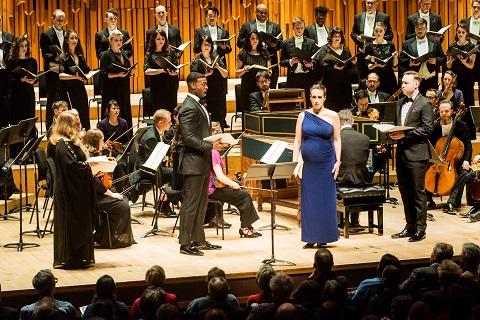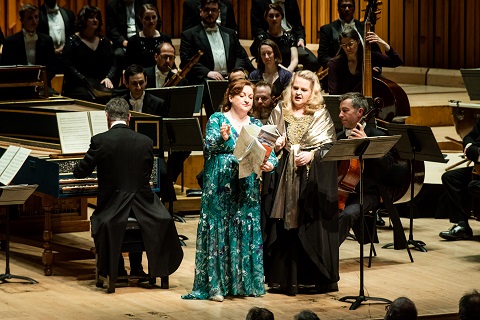06 Apr 2019
A superb Semele from the English Concert at the Barbican Hall
It’s good to aim high … but be careful what you wish for. Clichéd idioms perhaps, but also wise words which Semele would have been wise to heed.

It’s good to aim high … but be careful what you wish for. Clichéd idioms perhaps, but also wise words which Semele would have been wise to heed.
Enamoured of Jupiter, she craves to transcend her home among mere mortal and forge new heavenly alliances. Held back by practicalities, she refuses to compromise, preferring to push those close to her to the brink. When her wish is finally granted, the result is apocalyptic: she is consumed by thunderbolts, brusquely despatched to a galactic hinterland, and instantly regrets her own self-serving naivety and foolishness.
This tale of leaving, loving and losing may sound all too familiar, given the current political context. Certainly, William Congreve’s libretto - which was originally intended for a production which never took place, in the Queen’s Theatre some forty years previously, with music by John Eccles - reflected contemporary political anxieties, not least in its portrayal of a failed royal marriage. By the time an anonymous author adapted Congreve’s text for Handel’s 1743 Semele the political context had changed, but the rival London theatres were engaged in a political cut-and-thrust of their own, and Handel had already begun to look to the English oratorio as a form that might save his own financial bacon.
Semele was originally heard in a concert performance at Covent Garden in February 1744, presented ‘after the manner of an oratorio’. But, that didn’t fool anyone: Charles Jennens, librettist of Messiah among other Handel oratorios described Semele as a ‘bawdy opera’ while John Mainwaring, Handel’s first biographer, wrote in 1760 that ‘Semele is an English opera but called an oratorio, and performed as such’.
Concert, semi-staged, staged … none of these terms seem apt for this performance by The English Concert under their director Harry Bicket at the Barbican Hall. It was quite a simply an evening of delightfully and unwaveringly engaging theatre and a terrific musical treat. Un-costumed, and with gesture and movement left to the singers’ discretion, its dramatic impact derived solely from what we heard - from the superb team of soloists, instrumentalists and chorus - and from the manner of delivery as guided by Bicket and entrusted to the soloists’ own persuasive instincts, with several of the cast singing from memory and others almost entirely off-score.
And what a team of soloists it was: a genuine cross-Atlantic collaboration, with three singers hailing from the US and three from the UK. It was also satisfying to be given a chance to hear again singers who have recently impressed, as well as to hear new voices for the first time. The title role was taken by Brenda Rae whose Wigmore Hall debut at the end of 2018 made a striking impact. Recently, at the Royal Academy , Olivia Fuchs fashioned Semele into a celebrity YouTuber, worshipped by a crowd of social media obsessives; and, the theme of the 2019 London Handel Festival is Handel’s Divas. But, Rae’s Semele was no egotistical prima donna, strutting, stomping and sulking until she got her own way. Indeed, in Act 1 Rae was surprising restrained, holding back her silvery soprano and slightly concealing its shine, though even at its most tender and restrained Rae’s vocal line floated above or through the accompaniment with focus and presence. The first sign of mischief came with the act-ending ‘Endless Pleasures, endless love), Rae’s eye’s glinting with a hint of the vocal sparkle that would later erupt.
 Elizabeth DeShong (Juno/Ino), Soloman Howard (Somnus/Cadmus), Brenda Rae (Semele), Christopher Lowrey (Athamas). Photo credit: Robert Workman.
Elizabeth DeShong (Juno/Ino), Soloman Howard (Somnus/Cadmus), Brenda Rae (Semele), Christopher Lowrey (Athamas). Photo credit: Robert Workman.
This was a gentler Semele than we are sometimes presented with, and Rae’s affecting shapeliness of phrase in Semele’s Act 2 arias, ‘O sleep, why does thou leave me?’ and ‘With fond desiring’, made her dilemma and doubts more poignant than is sometimes the case. In Act 3, though, urged on by Juno, Semele’s solipsism erupted in a glistening display of self-love: ‘Myself I shall adore’ was a glory of rib-tickling coyness, and now the strength of Rae’s soprano was unleashed, the jewel-like spark lit. The coloratura was so smooth and clean it seemed almost too easy. And, luminosity marked Semele’s repentance of her destructive ambition, suggesting less regret than acceptance.
Two recent appearances in the role of Butterfly’s maid, Suzuki, by mezzo-soprano Elizabeth DeShong - at the ROH in 2017 and at Glyndebourne last year - whetted the appetite for her doubling up here as Ino/Juno, and we were not disappointed. Despite a spangly silver shawl, it wasn’t always clear where Ino ended and Juno began, but that was of no import. Like Handel’s genre, DeShong’s voice seems to elude definition: soprano, mezzo, contralto, it encompasses and assimilates elements of them all. The top notes tingled, and the lower inky expanses mesmerised. What wonderful layers and textures, too: plummy, honeyed, smoky, gleaming. DeShong’s range seems limitless, rising and falling, and it’s a voice that feels free but is meticulously focused. The legato phrases of ‘Turn hopeless lover’, in which Ino first expresses her unrequited love, were exquisitely sculpted but replete with burning, repressed passion. The self-congratulatory extravagances of Ino’s moment of self-determination, ‘Hence, Iris, hence away’, were bulls-eye-precise and lyrically appealing - no hint of hootiness, though vigorously accented.
 Ailish Tynan (Iris) and Elizabeth DeShong (Ino). Photo credit: Robert Workman.
Ailish Tynan (Iris) and Elizabeth DeShong (Ino). Photo credit: Robert Workman.
Benjamin Hulett was a dashing and, paradoxically, very ‘human’ Jupiter, evincing real flesh-and-blood ardency and compassion. In Act 2 Jupiter has three very different arias in close succession and Hulett was master of them all. The long, long line he crafted in ‘Lay your doubts and fears aside’ attested to both courage and an excellent breathing technique, while ‘I must with speed amuse her’ was agile and accurate. ‘Where’er you walk’ resonated with genuine feeling. If some of Hulett’s ornamentations of the da capo repeats were elegant but decorative rather than expressive then who could complain.
I have not heard American bass Soloman Howard before, but I’d very much like to hear him again soon. His Cadmus, King of Thebes, was authoritative but truly melodious - a quite spiritual and reverential father, rather than a bullying patriarch. Howard expressed Somnus’s sleepy displeasure, in ‘Leave me, loathsome light’, in a wearily distanced tone and, at the mention of the nymph Pasithea, his sudden perky transformation into agile virility in the ensuing ‘More sweet is that name’ was classic comic understatement.
Ailish Tynan’s Iris was a fizzing bundle of fun-loving pragmatism; she had no time for Ino’s moping, resourcefully supplying her with a road-map of the planetary spheres, and when her practical efforts were spurned, kicking the map aside and tormenting her mistress with an Okay magazine centrefold of the soon-to-be-weds, then flouncing off to indulge in the gossip. Iris’s report that Jove has installed Semele in a palace atop a mountain, ‘There, from mortal cares retiring’, shone brightly and gave Tynan the opportunity to display her terrific trill.
Christopher Lowrey was an agile-voiced Athamas, and his countertenor carried easily with no hint of strain. The roles of the Priest (Act 1) and Apollo (Act 3) were taken confidently by Joseph Beutel and Brian Giebler respectively, members of the fabulous Clarion Choir whose intonation and diction were immaculate and who showed they could sing a fugue with light vigour as readily as they could conjure an expressive expanse of sustained and sensitive sound. There was so much drama, too, in the playing of the English Concert. Nadja Zwiener worked tirelessly and, paradoxically, her labours resulted in a wonderful lightness: the violins’ bows were tremendously buoyant, almost breathlessly so. Some might have found the string textures too ‘short and spiky’, but warmth derived from the full complement of players - even if the woodwind did not always manage to come to the fore - and Joseph Crouch’s cello obbligatos were highlights of a stellar evening.
With the London Handel Festival in full swing and the ROH’s Berenice playing in the Linbury there are no shortage of Handelian treats currently available in London at this time. But, this Semele was a special performance. And, Brenda Rae saved the best until last: as Jupiter appeared in god-like form, thus sealing her fate, “Ah me! Too late I now repent” was her own heavenly response. Self-adoring she may have been, but at that moment she was simply awe-inspiring and adorable.
Claire Seymour
Handel:
Semele
The English Concert/Harry Bicket (director, harpsichord)
Semele - Brenda Rae, Juno/Ino - Elizabeth DeShong, Somnus/Cadmus - Soloman Howard, Jupiter - Benjamin Hulett, Iris - Ailish Tynan, Athamas - Christopher Lowrey, Apollo - Brian Giebler, Priest - Joseph Beutel, Clarion Choir (Artistic Director - Steven Fox)
Barbican Hall, London; Friday 5th April 2019.